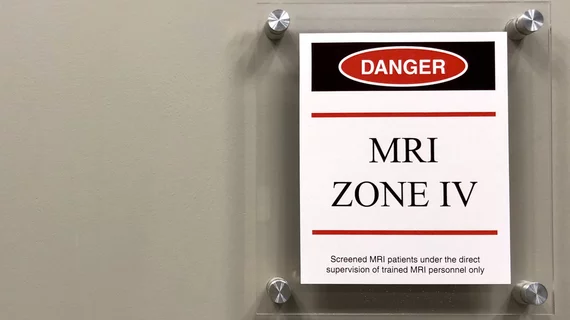CMS to make proposed MRI safety codes official
On Friday, the Centers for Medicare and Medicaid Services made a group of proposed codes related to MRI safety official.
The news comes after the codes were proposed over the summer to be included in the 2025 Medicare Physician Fee Schedule. The new code family was created “to describe magnetic resonance examination safety procedures and capture the physician work involving patients with implanted medical devices that require access to MR diagnostic procedures,” CMS says.
Amid an environment of ever-evolving MRI technology and an aging and medically complex population, it can be difficult to determine an implanted medical device’s compatibility with different scanners, though doing so is crucial to preventing adverse events that could harm patients. Determining device compatibility can be time-consuming, and with many imaging departments burdened by a growing demand for services, the extra steps necessary to ensure patient safety create added stress on staff and providers.
These new codes are intended to reimburse providers for that extra work. In total, there are six: 76014, 76015, 76016, 76017, 76018 and 76019.
The first code, 76014, relates to assessing implants and foreign bodies, including the identification and verification of implant components. This could also include analyzing the current MR conditional status of individual components and systems of devices. This code covers an initial 15 minutes. The subsequent code, 76015, does the same, but covers additional time needed beyond 15 minutes.
Next in line, 76016, includes the review of implant MR conditions for indicated MR exam, analysis of risk versus clinical benefit, and determination of MR and accessory equipment, and the expertise required to perform the examination with written report. The following code, 76017, reimburses for medical physics examination customization, planning and performance monitoring by a medical physicist or MR safety expert; this could also include review by a physician or qualified health care professional to prioritize and select views and sequences.
Code 76018 addresses implant electronics preparation (programming a pacemaker, for example) under supervision of physician or other qualified healthcare professional. The final code, 76019, is similar to its predecessor, covering implant positioning and/or immobilization under supervision, including application of physical protections to secure implanted medical devices from MR-induced vibrational forces, magnetically induced functional changes, and/or prevention of radiofrequency burns from inadvertent tissue contact while in the MR room with written report.
CMS has not yet shared what the reimbursement rates will be for each code, but that information will likely be released soon.

